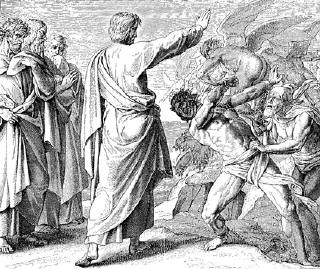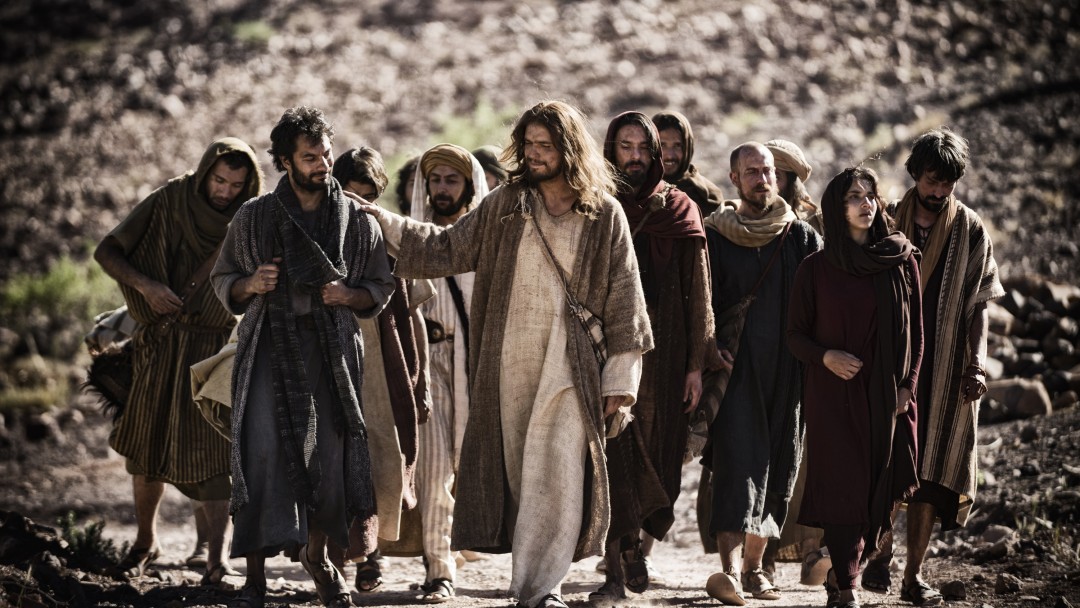25 “Be quiet!” said Jesus sternly. “Come out of him!” 26 The impure spirit shook the man violently and came out of him with a shriek.
This passage, begins with Jesus, while passing through Capernaum, stopping in at the synagogue there and starting to teach. This was not uncommon for travelling Rabbis. But what had the people there somewhat more than startled was that he was giving his own teaching, his own interpretation of the Scriptures as if he had the authority and was ordained to do so. It is pointed out that the revered "teachers of the law" did not have this authority and this left the people wondering by what authority or "certification" did he consider himself to have the right.
In Jewish society only those Rabbis who were ordained and recognized by the community as having s'mikhahto, or, "authority", were allowed to give their own interpretation of the law and Scripture in general. All other teachers were expected to only recite existing accepted interpretations, commonly the "yoke", or interpretation and lifestyle passed on to them by the Rabbi who they had studied under and been a talmidim, or disciple of. This was treated very seriously with Jesus' act being like someone today practising medicine without a medical license, or setting themselves up in a courtroom to decide legal cases without being appointed or elected. Being recognized in the community as having s'mikhahto meant that a person was authorized to pass legal judgements and tell people how they should be living their lives, how they should be practising and living out their part of the Covenant with God.
http://www.chabad.org/library/article_cdo/aid/1933944/jewish/What-Is-a-Rabbi.htm
Given this information, you can imagine what a big deal it would be for Jesus, who was not certified in this manner, to start offering his own interpretation of Scripture and how people should live and act to fulfil the Covenant. The passage states that the people were, "amazed" that he was teaching with authority. In the Greek, ἐξεπλήσσοντο (exeplēssonto). Strong's Concordance defines this expression as: I am thunderstruck, astounded (1605 )
In Mark's story we immediately go from the people in the Synagogue being struck with shock and panic at finding Jesus to be claiming an authority he has not been licensed to hold to what seems to be a complete non-sequitur:
Just then a man in their synagogue who was possessed by an impure spirit cried out, 24 “What do you want with us, Jesus of Nazareth? Have you come to destroy us? I know who you are—the Holy One of God!”A man possessed by a demon starts addressing Jesus and shouting at him. However, when we look at what the impure spirit says, we realize it is not a non-sequitur at all, but an answer to the unspoken question from the previous verse, "Where does Jesus get his authority? What gives him the right to give his own teaching and tell people how they should live their lives?".
The unclean spirit recognizes Jesus' identity as the, "Holy One of God", and appears fearful that Jesus will destroy him, conferring to him the authority and ability to perform this act on a being of the supernatural realm. The implication is that beings of the supernatural realm recognize and vouch for his authority. There is also an implication that those who are in touch with the supernatural, those who, "know God", would recognize Jesus authority and would recognize that his teaching is, "of God".
So, why did the community of Mark tell this particular story about Jesus, in this particular way? What did it mean to them? Although it is believed that there was a Gentile portion of the community, the majority were most likely Jewish. Whether the community was in one of the provinces of Palestine or somewhere in the diaspora, there would have been other Jews around who would question the way they chose to live. They would ask why members of this community, if they claimed to be part of Judaism, did not follow an authorized and accepted interpretation of the law and Jewish practice. Why did the community not follow the laws and practices the way they did? How could they consider themselves legitimate Jews if they followed the yoke and teaching of an un-ordained, unrecognized Rabbi who operated outside of the chain of s'mikhahto passed down from one Rabbi to the next in the Sinaic tradition.
The community's response through this story was that this authority came from supernatural recognition and appointment rather than tradition and the, "systems of man". And that the truth of this could be found by those who "know God" recognizing his word rather than the dictates of tradition.









